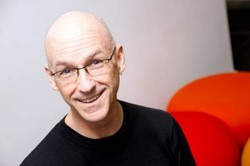 I’ve been trying to define what kind of scholar I am for five years now. My answer remains fluid — a bit more like Silly Putty now, but not yet firm like concrete — perhaps to the dismay of my current adviser. The journey of discovery is a more finely honed process than initially expected. Arriving in grad school, I simply thought I’d be trained to become a scholar — you know, like every other scholar. Of course, I quickly learned that this involved a game of Twister, placing hands and feet on established fields, theoretical perspectives, and myriad schools of thought, as well as playing tug-of-war with my own critical insights, situated knowledges, and bees in various bonnets. Thankfully, my first cohort (at UI-Chicago) happened to be one that landed in front of Kevin Barnhurst for class one, semester one: Philosophy of Communication. With Kevin at the helm, this introductory comm course achieved what comm courses can be so good at. Starting with holistic reference points from John Dewey to James Carey, you can’t help talking about more life than lit. Kevin’s approach to the class could have been better titled So You Want to Be an Academic? Week two on the syllabus: “How to Ask Interesting Questions.” Week four, a typical macro POV: “Approaches to the World.” The experience was like starting with just the You Are Here dot and having someone draw the map around it. Kevin, though, only sketched the basic outline of things before handing you the tools to complete and color the map, including some erasers. Kevin’s career as a thoughtful, humanistic media scholar is now ably documented in obituaries — he died suddenly on June 2, a heart attack at home — but far beyond his CV he’ll remain important to me as an inspirational mentor. He was instrumental in assuring me, a journalist, that I could transition from my professional style of inquiry to that of academia; one of his observations: Although the vocabularies differ, the [journalistic and scientific] processes closely parallel each other. Both attend to occurrences out there, formulating guesses (which become events or hypotheses), both resolve issues to arrive at facts (or theories) and both seek to establish truth (or paradigm). His loss was especially jarring not only because Kevin had remained in my life personally and professionally — he’d just emailed me days earlier, and I’d been shopping around a review of his new book, which publishes this month — but because his counsel has been a voice in my head ever since. When I’m ensnared in the inevitable politics of departments and degree requirements, I hear Kevin reminding me that, yes, structures exist but that my own agency and persistence is what ultimately remodels them. When I’ve read and/or written too much, I hear Kevin reminding me to do something “wordless,” because there are experiences beyond language. When my inferiority complex and impostor syndrome combine into a perfect storm of despair, I hear Kevin telling me that scholarship is just "gardening." One particular digging tool of Kevin’s is an exercise I’ve come back to on numerous occasions, and I feel it important to share.
It’s a quiz, of sorts, with no correct answers. He called it a “personality test” when he presented it to us on the first day of Philosophy of Communication, and he stressed that these are important answers to fashion for ourselves as aspiring scholars. Not knowing epistemology from epinephrine on that first day, I marveled at what my answers might foretell. I’ve gone back to this quiz a couple of times since — it’s enlightening to see how answers evolve, and which ones (like the changing lines in an I Ching consultation) — and in my next email reply I was going to mention to Kevin that I’d done this again that week ahead of my qual exams. Kevin’s answers were clear and firm: he was, he said afterward, “an absolute empiricist,” a pragmatist who believed that knowledge comes only through experience, that reality is socially constructed, and that value-free research was an impossibility. In the hopes that someone else might benefit from this exercise as much as I have thus far, here are Kevin’s ism-clarifying questions: 1. Can knowledge exist before experience? 2. How certain can knowledge be? 3. Where does knowledge come from? 4. Is knowledge conceived in parts or wholes? 5. Is knowledge explicit or tacit? 6. Do humans make real choices? 7. Do humans act out of stable states or mutable traits? 8. Is human experience individual or social? 9. Is life universal or contextual? 10. Can/should scholarship be value-conscious or value-free? 11. Should scholarship aim for change or understanding? 12. Does inquiry influence what you study? Academics old and young also may benefit from some oft-shared resources of Kevin's, like the life-saving guides to reading social-science scholarship — not only his sage how-to but his reading worksheet — and other docs and syllabi still available on his web page.
0 Comments
Leave a Reply. |
this blahg
I'm THOMAS CONNER, Ph.D. in Communication & STS, and a longtime culture journalist. Categories
All
Archives
June 2024
|

 RSS Feed
RSS Feed